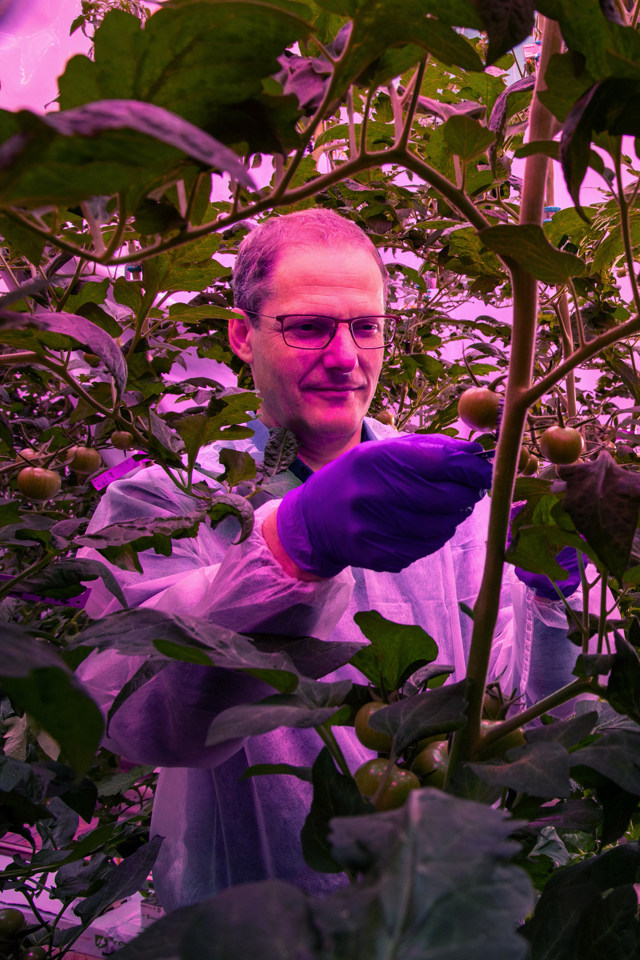We provide the targeted, all-in-one answer to every cultivation question. Customized greenhouse solutions that fit perfectly in any situation, in any place. Anywhere in the world!
Greenhouse vegetables to be grown CO2 negative from now on

Dutch innovation can turn horticulture from CO2-emitter to CO2-reducer
The world's first CO2-negative greenhouse is on the market. This technical innovation produces large quantities of fresh vegetables, with less fossil energy consumption and even lower costs per kilo of fresh product than regular greenhouses. Westland horticultural innovator KUBO has launched the groundbreaking greenhouse to horticulturists, investors and governments during the GreenTech RAI from June 11 to 13 in Amsterdam. This new development shows that the greenhouse horticulture sector is taking responsibility; for both food security and CO2 reduction and is bound to attract great interest in international markets With this development, the greenhouse horticulture sector is showing that it is taking responsibility; for both food security and also CO2 reduction.
Global solution
The international KUBO Group, a family business since 1946, has been innovating cultivation methods and its range of greenhouses for decades. This breakthrough innovation is necessary for achieving more sustainable global food production and comes at a time when the world can make excellent use of CO2-negative vegetable cultivation.
“We are pragmatists and are not a company that goes through elongated scientific processes. When our Blue Lab research team makes a discovery, it is tested several times in separate greenhouses and technically developed into an ultimate market product. For validation we work with partners such as the Anthesis Group and SBTi, but when it gets the green light it has to go to market,” says KUBO's CEO Wouter Kuiper.
KUBO is already successfully implementing the new greenhouses with some regular customers, but is now looking to accelerate and expand in order to make a truly sustainable impact. That is why investment companies and governments in Europe, the Middle East, North America and Asia are also being proactively updated on KUBO’s newest, sustainable, local food production opportunities.
Operation based on data analysis and technical adaptations
The most widely produced vegetable worldwide is the tomato. This is where the first tests took place because the state of the tomato greenhouse can be precisely monitored using the latest climate systems. Via a continuous stream of data, the optimal amount of nutrients can also be precisely fed to the plants. This is how KUBO came to require less energy, less water and fewer pesticides.
But the core of the sustainability discovery is that there is no extra CO2 addition necessary for the growth of vegetables. The previously added extra CO2 also left the greenhouse again through the skylight. By technically creating the optimal outside air ventilation flow past the leaves, the plants are able to get their own CO2 from outside air instead of it needing to be added. The result of the cultivation discovery and technical greenhouse modifications is the first CO2-negative greenhouse, as vegetable production extracts carbon from the outside air.
Confidence in innovation
Sustainable innovation is plentiful, but typically only gets impact when the ROI (return on investment) is not only positive for the planet, but also for production and returns to investors. The overall business picture must be positive, which is true in the case of this pioneering greenhouse innovation. Professor Leo Marcellis of the WUR: “The horticultural sector needs to be innovative and come up with solutions. If the facts tested by KUBO about food volumes, costs and sustainability gains hold up now in the global rollout, it shows how innovative the sector faces its future. I am very curious to see the further results.”
“The horticultural sector needs to be innovative and come up with solutions."
LEO MARCELIS - PROFESSOR OF HORTICULTURE AND PRODUCT PHYSIOLOGY AT WAGENINGEN UNIVERSITY & RESEARCH
Watch and listen: live expert roundtable 28 May
To celebrate the world's first CO2-negative greenhouse, KUBO is hosting a roundtable discussion, broadcast live online, on the theme: Can we let go of the dogma: 'an increase in production always goes hand in hand with increased environmental impact’? This live, discussion with outside food chain and sustainability experts is on May 28 from 2:00 to 2:45 p.m. (in English) and can be attended by all interested via this link.
Watch and listen:
live expert roundtable 28 May



